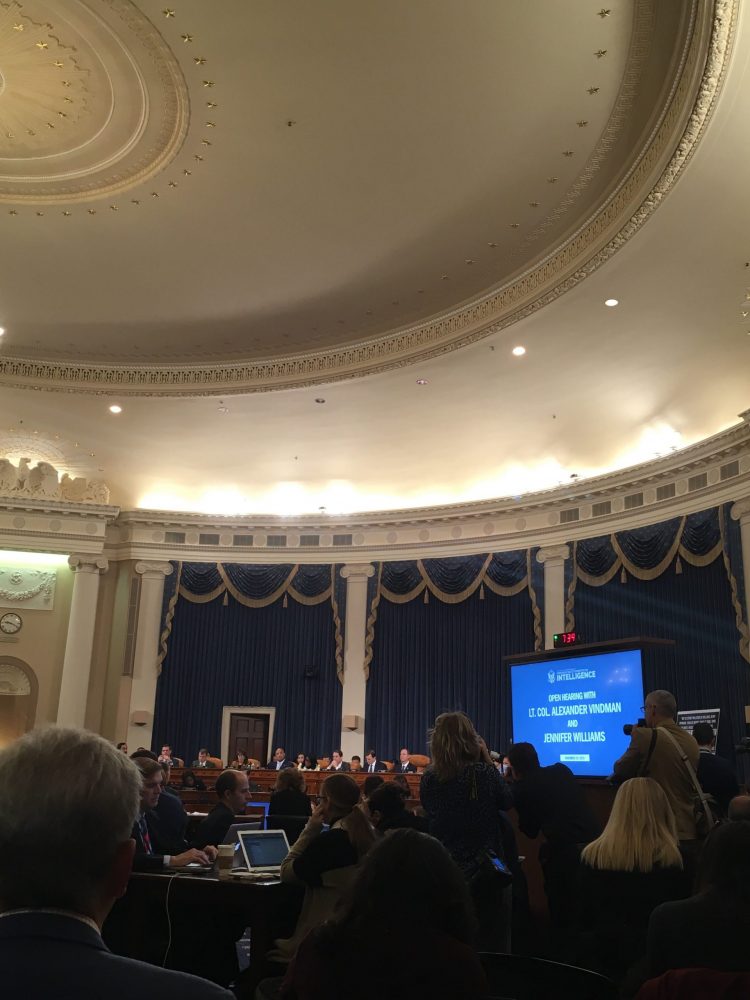WASHINGTON – Two White House officials and a former official with key roles in shaping the Trump administration’s policy towards Ukraine testified Tuesday to Congress that they considered improper a July call by President Donald Trump to Ukraine’s president linking military aid to a probe into rival Joe Biden.
The testimony came during a lengthy third day of public impeachment hearings by the House Intelligence Committee into activities of the president.
Lt. Col. Alexander Vindman, a top Ukraine expert on the National Security Council, told lawmakers that it was his “duty” to relay his concerns to the White House counsel about the July 25 phone call in which President Donald Trump asked Ukraine leader Volodymyr Zelensky to investigate former Vice President Joe Biden. Vindman was on the call.
“I couldn’t believe what I was hearing,” Vindman said. “It was probably an element of shock — that maybe, in certain regards, my worst fear of how our Ukraine policy could play out was playing out, and how this was likely to have significant implications for U.S. national security.”
Jennifer Williams, the special adviser on Europe and Russia for Vice President Mike Pence, said she found the “call unusual because…it involved discussion of what appeared to be a domestic political matter.” She also was one of the officials on the call.
Democrats have tried to paint a picture of two separate policy channels with respect to Ukraine: one concerned with U.S. interests led by traditional foreign policymakers in federal agencies, and another shadow channel concerned with the president’s personal interests led by Trump’s lawyer Rudy Giuliani.
The impeachment proceedings have been focused on what Democrats consider an abuse of presidential power by Trump’s linking the release of vital military aid to Ukraine to that nation’s promise to probe Biden, his son Hunter, and supposed Ukrainian interference in the 2016 election, the latter the subject of a Russian disinformation campaign.
Republicans have made the argument that President Trump is challenging traditional foreign policy, upsetting career bureaucrats. California Rep. Devin Nunes, the ranking Republican on the panel, called the impeachment inquiry a “circus” that was not producing any evidence of wrongdoing by Trump. He also attacked the press, which he called “Democratic puppets.”
“The Democrats are out to get this president,” said Rep. Jim Jordan, R-Ohio.
GOP lawmakers also attempted, as they did during last week’s two hearings, to press for the identity of the anonymous whistleblower, whose concerns about the Trump call with Ukraine President Volodymyr Zelensky set the impeachment inquiry into motion in September.
“These proceedings will not be used to out the whistleblower,” Chairman Adam Schiff, D-California, warned.
On Giuliani’s efforts in Ukraine, Vindman said, “It certainly wasn’t helpful and didn’t advance U.S. national security interests.”
Vindman testified that at a July 10 meeting, U.S. Ambassador to the European Union Gordon Sondland told Ukrainian officials a White House meeting was conditioned on investigations.
Ambassador Kurt Volker, former special envoy to Ukraine who testified later in the afternoon, said that at the time, he did not make the connection that there could have been a connection between investigations into corruption at Burisma and investigations into the Bidens.
“In retrospect, I should have seen the connection differently, and had I done so, I would have raised my own objections,” Volker said.
Volker also said any suggestion that Biden’s policy towards Ukraine was corrupted because of his son’s position on Burisma was a “conspiracy theory.”
“I have known Vice President Biden for 24 years. He is an honorable man and I hold him in the highest regard,” he said, a rebuke to an oft-repeated GOP talking point during the hearings.
Vindman, an Iraq War veteran and Purple Heart recipient who appeared in his Army uniform, has seen his loyalty to the United States questioned among Republican members of Congress and some in the conservative media. Vindman was born in Kiev (then part of the Soviet Union) and immigrated with his father and brothers to the United States in 1979.
During his opening statement Vindman called attacks on public servants, including himself and ousted ambassador to Ukraine Marie Yovanovitch “reprehensible.”
Tim Morrison, the lieutenant colonel’s former boss at the National Security Council, told the committee that he got a “sinking feeling” on Sept. 7 after a conversation with U.S. Ambassador Gordon Sondland. The envoy to the European Union told him the military aid to Ukraine was dependent on the announcement of Ukrainian probes into the Bidens and the 2016 election.
Morrison said he relayed that information to then-National Security Adviser John Bolton.
“He said to tell the lawyers,” Morrison said. “He did not explain his direction.”
But Morrison, who was on the July 25th call between Trump and Zelensky, told the committee he did not hear a demand on the part of the American president.
The White House sought to discredit Vindman and Williams during their testimony, who remain members of the administration.
The White House Twitter account published a phrase from Morrison’s private deposition questioning Vindman’s judgment.
Williams “never reported any personal or professional concerns to me, her direct supervisor, regarding the call,” said Lieutenant General Keith Kellogg, National Security Adviser to Pence in a statement. He added that there was nothing inappropriate about the call.
“Republicans are absolutely killing it. Because it’s a big scam,” Trump said to reporters at the White House.
Near the conclusion of his testimony, Rep. Sean Patrick Maloney, D-New York, asked Vindman why he would take the professional and personal risk of challenging the actions of the president of the United States.
“Congressman, because this is America,” the soldier replied. “This is the country I have served and defended, that all of my brothers have served. And here, right matters.”
Many in the hearing room applauded.

